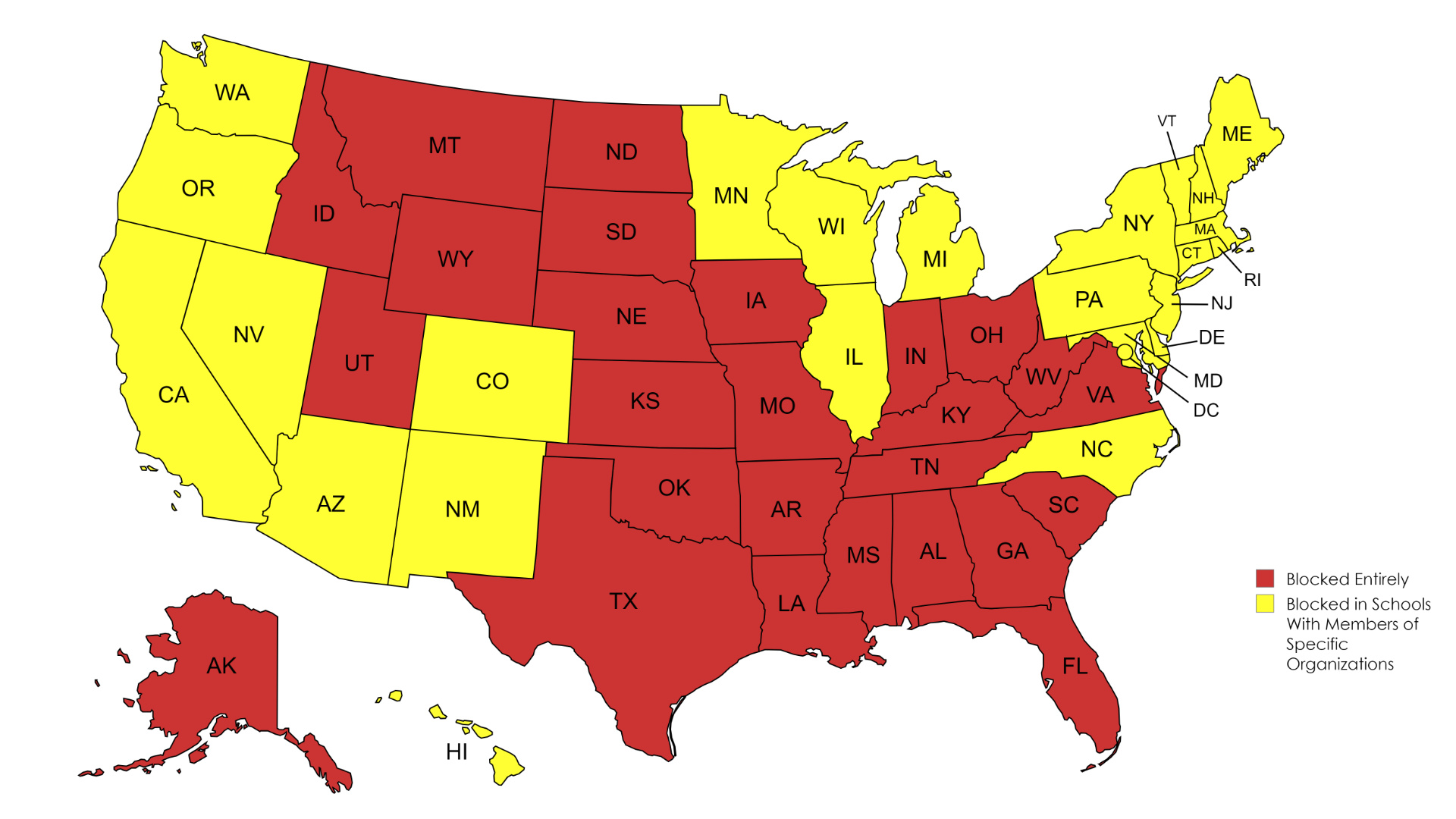Update: On January 9, 2025, these regulations were vacated in federal court and are no longer in effect.
The Biden administration’s Title IX regulations go into effect today…sort of. As the map indicates, the regulations are fully blocked in twenty-six states: Alabama, Alaska, Arkansas, Florida, Georgia, Idaho, Iowa, Indiana, Kansas, Kentucky, Louisiana, Mississippi, Missouri, Montana, Nebraska, North Dakota, Ohio, Oklahoma, South Carolina, South Dakota, Tennessee, Texas, Utah, Virginia, West Virginia, and Wyoming.
Additionally, in every other state and in Washington, D.C., the regulations are blocked in well over a thousand schools attended by members (or children of members) of the organizations Moms for Liberty, Young America’s Foundation, and Female Athletes United. This includes K-12 schools and colleges and universities.
Unless you are a Title IX/student affairs administrator, this is an amazing development. The Biden administration clearly overplayed its hand, and the litigants and amici were more than capable of taking advantage of it. Below is an updated summary of the injunctions:
Injunctions Roundup
Eight injunctions have blocked the regulations at the state level. They are:
- State of Alabama et al v. U.S. Secretary of Education, issued on appeal July 31 by the Eleventh Circuit. This reverses the district court’s denial of injunctive relief and bars the regulations from going into effect in Florida, Georgia, Alabama, and South Carolina. Because the plain language of the order is not limited to geography and courts do sometimes grant relief broader or other than what is requested, this prompted discussions of whether this is a nationwide injunction. That seems less likely as time passes; the plaintiffs only requested that the regulations be blocked in the four states, and the Eleventh Circuit has not clarified otherwise despite a filing from the Department of Education indirectly prodding them.
- State of Oklahoma v. Miguel Cardona et al, issued July 31 by Judge Jodi Dishman and blocking the regulations in Oklahoma. No appeal here yet, either.
- State of Arkansas v. U.S. Dept. of Ed., issued July 24 by Judge Rodney Sippel and blocking the regulations in Arkansas, Missouri, Iowa, Nebraska, North Dakota, and South Dakota.
- State of Texas v. USA, issued July 11 by Judge Matthew Kacsmaryk. This decision bars the regulations from going into effect in Texas.
- Carroll ISD v. U.S. Dept. of Ed, issued July 11 by Judge Reed O’Connor. This decision is limited to one school district in Texas.
- State of Kansas v. U.S. Dept. of Ed, issued July 2 by Judge John Broomes in U.S. District Court for the District of Kansas. This injunction bars the regulations from going into effect in Kansas, Alaska, Utah, Wyoming, and in other states attended by the members of various organizations.
- State of Tennessee v. Miguel Cardona et al, issued June 17 by Judge Danny Reeves in U.S. District Court for the Eastern District of Kentucky. This order is limited to Tennessee, Kentucky, Ohio, Indiana, Virginia, and West Virginia.
- State of Louisiana v. U.S. Dept. of Ed, issued June 13 by Judge Terry Doughty in U.S. District Court for the District of Louisiana. This order affects the states of Louisiana, Mississippi, Montana, and Idaho.
The Future
Remember that these are temporary injunctions. They require further action by the courts to be converted into something more permanent. In addition, we are still awaiting decisions from circuit courts and the U.S. Supreme Court. A caution of “it’s not over until it’s over” is warranted, but the trend so far is favorable to opponents of the Biden Title IX regulations.
Thank You for Reading
If you like what you have read, feel free to sign up for our newsletter here:
About the Author
Related Posts
Update: On January 9, 2025, these regulations were vacated in federal court and are no longer in effect.
The Biden administration’s Title IX regulations go into effect today…sort of. As the map indicates, the regulations are fully blocked in twenty-six states: Alabama, Alaska, Arkansas, Florida, Georgia, Idaho, Iowa, Indiana, Kansas, Kentucky, Louisiana, Mississippi, Missouri, Montana, Nebraska, North Dakota, Ohio, Oklahoma, South Carolina, South Dakota, Tennessee, Texas, Utah, Virginia, West Virginia, and Wyoming.
Additionally, in every other state and in Washington, D.C., the regulations are blocked in well over a thousand schools attended by members (or children of members) of the organizations Moms for Liberty, Young America’s Foundation, and Female Athletes United. This includes K-12 schools and colleges and universities.
Unless you are a Title IX/student affairs administrator, this is an amazing development. The Biden administration clearly overplayed its hand, and the litigants and amici were more than capable of taking advantage of it. Below is an updated summary of the injunctions:
Injunctions Roundup
Eight injunctions have blocked the regulations at the state level. They are:
- State of Alabama et al v. U.S. Secretary of Education, issued on appeal July 31 by the Eleventh Circuit. This reverses the district court’s denial of injunctive relief and bars the regulations from going into effect in Florida, Georgia, Alabama, and South Carolina. Because the plain language of the order is not limited to geography and courts do sometimes grant relief broader or other than what is requested, this prompted discussions of whether this is a nationwide injunction. That seems less likely as time passes; the plaintiffs only requested that the regulations be blocked in the four states, and the Eleventh Circuit has not clarified otherwise despite a filing from the Department of Education indirectly prodding them.
- State of Oklahoma v. Miguel Cardona et al, issued July 31 by Judge Jodi Dishman and blocking the regulations in Oklahoma. No appeal here yet, either.
- State of Arkansas v. U.S. Dept. of Ed., issued July 24 by Judge Rodney Sippel and blocking the regulations in Arkansas, Missouri, Iowa, Nebraska, North Dakota, and South Dakota.
- State of Texas v. USA, issued July 11 by Judge Matthew Kacsmaryk. This decision bars the regulations from going into effect in Texas.
- Carroll ISD v. U.S. Dept. of Ed, issued July 11 by Judge Reed O’Connor. This decision is limited to one school district in Texas.
- State of Kansas v. U.S. Dept. of Ed, issued July 2 by Judge John Broomes in U.S. District Court for the District of Kansas. This injunction bars the regulations from going into effect in Kansas, Alaska, Utah, Wyoming, and in other states attended by the members of various organizations.
- State of Tennessee v. Miguel Cardona et al, issued June 17 by Judge Danny Reeves in U.S. District Court for the Eastern District of Kentucky. This order is limited to Tennessee, Kentucky, Ohio, Indiana, Virginia, and West Virginia.
- State of Louisiana v. U.S. Dept. of Ed, issued June 13 by Judge Terry Doughty in U.S. District Court for the District of Louisiana. This order affects the states of Louisiana, Mississippi, Montana, and Idaho.
The Future
Remember that these are temporary injunctions. They require further action by the courts to be converted into something more permanent. In addition, we are still awaiting decisions from circuit courts and the U.S. Supreme Court. A caution of “it’s not over until it’s over” is warranted, but the trend so far is favorable to opponents of the Biden Title IX regulations.
Thank You for Reading
If you like what you have read, feel free to sign up for our newsletter here:
About the Author
Related Posts
More from Title IX for All
Accused Students Database
Research due process and similar lawsuits by students accused of Title IX violations (sexual assault, harassment, dating violence, stalking, etc.) in higher education.
OCR Resolutions Database
Research resolved Title IX investigations of K-12 and postsecondary institutions by the Department of Education’s Office for Civil Rights (OCR).
Attorneys Directory
A basic directory for looking up Title IX attorneys, most of whom have represented parties in litigation by accused students.







